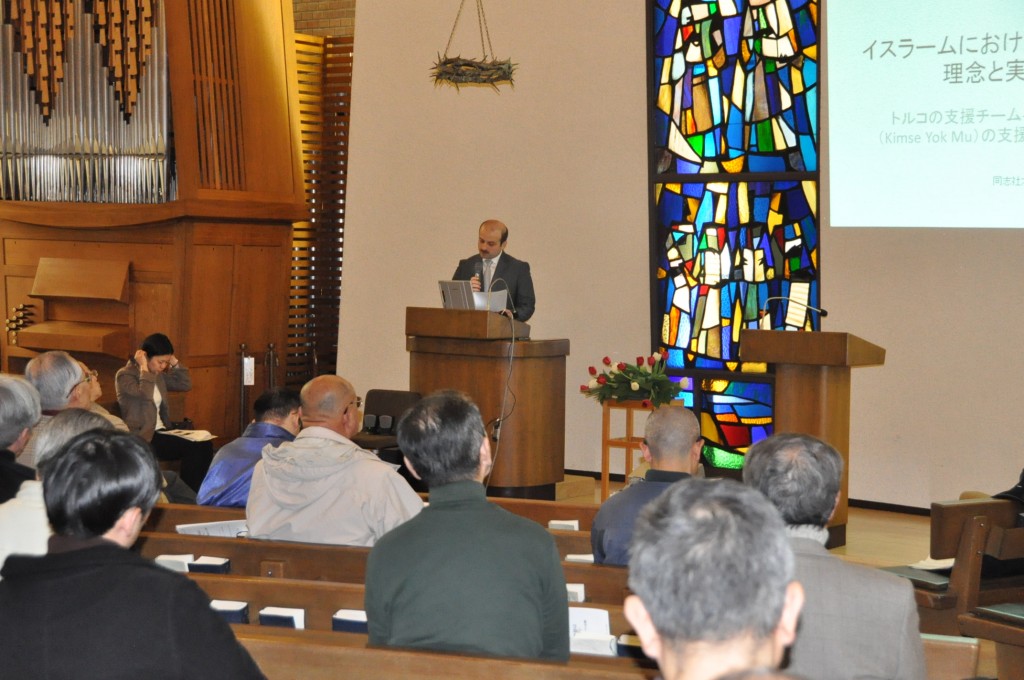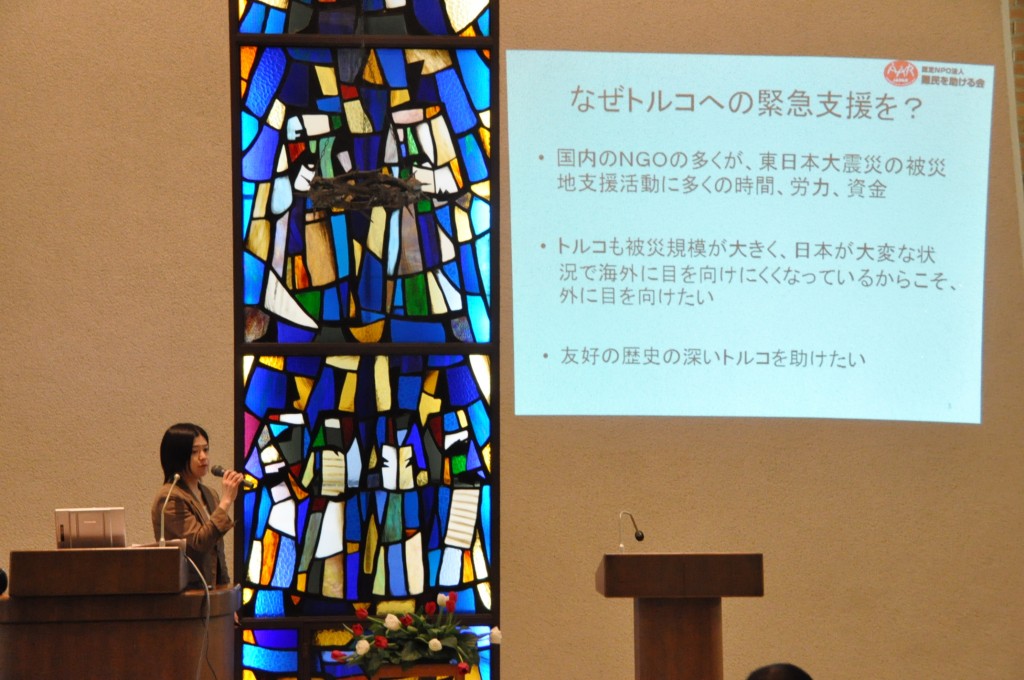Center for Interdisciplinary Study of Monotheistic Religions(CISMOR)Doshisha University
> Public Lectures > How Will Islamic Mutual Aid be Demonstrated? Looking at Activities in the Aftermath of The Great East Japan Earthquake and the Great Earthquake in Eastern TurkeyPublic Lectures
Public Symposium by Project 2
How Will Islamic Mutual Aid be Demonstrated? Looking at Activities in the Aftermath of The Great East Japan Earthquake and the Great Earthquake in Eastern Turkey
| Date: |
2012/02/25 15:00− 17:20 |
|---|---|
| Place: | Divinity Hall Chapel, Imadegawa Campus, Doshisha University |
| Lecture: |
Miyuki KONNAI, Program coordinator, Association for Aid and Relief, Japan (AAR JAPAN) Idris DANISMAZ, Part-time lecturer of the Graduate School of Global Studies, Doshisha University |
| Summary: | |
|
【Program】 ◆Lecture Miyuki KONNAI Idris DANISMAZ ◆Panel Discussion Miyuki KONNAI, Idris DANISMAZ Moderated by Prof. Masanori NAITO, Professor of Graduate School of Global Studies, Doshisha University Recently, it has become more common that, in the wake of a huge natural disaster, international rescue and aid operations are launched in affected areas, regardless of whether they occur in developed or developing countries. Here, private NPOs play as an important role as governmental agencies. Thus, how does the spirit of such “mutual aid” reveal itself across borders? Two lecturers reported their experiences with two great earthquakes that occurred in 2011—the Eastern Turkey Earthquake (October 23) and the Great East Japan Earthquake (March 11). During the lectures, the Turkish words “kimse yok mu” were heard very frequently. This phrase means “Is anybody there?” and it has been recognized as a symbol of rescue and aid activities in Turkey since the Marmara Earthquake (Western Turkey Earthquake) that occurred in 1998. For example, one of the private humanitarian aid groups established after this earthquake was named “Kimse Yok Mu.” One of the lecturers, Ms. Miyuki Konnai, was engaged in aid activities in Van Province in Turkey where the Eastern Turkey Earthquake caused devastating damage, as a member of a three-person aid team sent by an NPO, the Association for Aid and Relief, Japan. Working jointly with the above-mentioned Kimse Yok Mu and a group of volunteer interpreters known as the “Disaster Relief Interpreters” (ARC), she was mainly in charge of surveying damage caused by the earthquake, grasping local needs, and delivering food and aid supplies to those affected. During the aid activities, she and her aid team was involved in a life-threatening accident—the collapse of the hotel where her team stayed—caused by the second powerful tremor. A rescue operation was immediately launched calling “kimse yok mu,” and Ms. Konnai was saved about six hours after the collapse, but 50 persons were buried alive in the wreck and many of them died, including her colleague, Mr. Atsushi Miyazaki. Ms. Konnai explained how the rescue operation had been conducted by showing many photos, while touching on her experience of falling victim to the earthquake herself. She gave special emphasis on: (1) the necessity of having positive communications with local aid groups and those affected, in order to have a correct understanding of what is needed for aid groups, and (2) the importance of the spirit of “mutual aid” that naturally reveals itself among the affected parties. In the wake of the Great East Japan Earthquake, many relief and aid organizations, both Japanese and foreign, played an important role in the affected areas. Kimse Yok Mu is among such organizations. Dr. Idiris Danismaz, a lecturer of Doshisha University, worked with Kimse Yok Mu to support victims in cooperation with the Turkish Embassy in Japan and the Turkey Japan Cultural Dialog Society. In the activities, Dr. Danismaz gave special importance to extending support to children. After the emergency rescue needs in the affected areas were generally satisfied, 60 children were invited to Turkey with the support of Turkish Airlines. This invitation was designed to help the affected children overcome their psychological trauma. Reportedly, the children had fun with Turkish children and enjoyed local cultural and natural attractions. Kimse Yok Mu also assists Turkish people living in Japan in implementing a financial aid program for children affected by the earthquake, under which tuitions are paid in full for one fourth of the students in each class of an international school run by Turkish people in Sendai City. Even before their relief activities in the aftermath of the Great East Japan Earthquake, Kimse Yok Mu already had an excellent track record in delivering humanitarian aid, starting from the Northern Sumatra Earthquake in 2004. They have since been active in many disaster-affected areas around the world, including Palestine, Lebanon, Peru, Bangladesh, Sudan, and Haiti. They also deliver aid to those in poverty and offer educational support in Turkey, which have earned them a very high reputation. Behind their activities is the spirit of “mutual aid”—an Islamic duty and virtue. (Especially, sadaqah, or the practice of giving charity to people in need, is recognized as one of the noble duties that Muslims should perform.) In saying so, Dr. Danismaz emphasized that the spirit of mutual aid is shared by all nations, though the reasons behind it may differ. While disasters always cause deep sorrow, they can also bring opportunities for “mutual aid” on an international scale, as shown by the activities of Kimse Yok Mu. Dr. Danismaz concluded with enthusiasm that such activities can contribute to solutions for the fundamental social problems that face humanity, such as poverty. After the lectures, a panel discussion was held with Professor Masanori Naito of Doshisha University as a moderator, where heated discussion took place regarding the preceding two lectures, while the lecturers answered questions arising from the floor. (Tadashi Nakatani, Research Fellow, CISMOR, Doshisha University) |
|
|
*This lecture will be given in Japanese *Admission Free, No Reservation Necessary. Hosted by: CISMOR Co-hosted by: Graduate School of Global Studies, Doshisha University School of Theology, Doshisha University |
|
|
Program (Japanese) |
|

